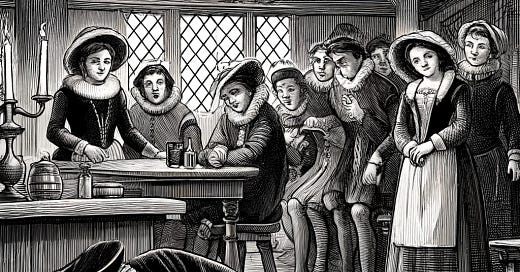The Mysterious Death of Rev. Archibald Glen
The Glen family is often remembered for its notable contributions to the church and community. Among them, Rev. Archibald Glen, a 16th-century minister, stands out not only for his ecclesiastical service but also for the mysterious and tragic circumstances surrounding his death. This blog post delves into the life and untimely demise of Rev. Archibald Glen, exploring the eerie tale of sorcery and witchcraft that clouded his final days.
Early Life and Ministry
Archibald Glen was born into the Glen family, a lineage marked by its prominence and respectability in Scottish society. He graduated from the University of Glasgow, where he received a robust education that prepared him for a life of service in the church. In 1596, he was ordained as the minister of Rutherglen, a position he held with distinction before being translated to Carmunnock in 1603.
Rev. Glen was known for his devoutness, eloquence, and dedication to his parishioners. His ministry was characterized by a deep commitment to spiritual and moral guidance, earning him the admiration and respect of his community. He served as a guiding light for many, offering solace, advice, and spiritual support. However, despite his pious and exemplary life, Rev. Glen's story took a dark and unexpected turn in his later years.
The Dark Shadows of Sorcery
In February 1614, at the age of 44, Rev. Archibald Glen died suddenly, leaving his family and congregation in shock and grief. The cause of his death was not attributed to natural illness or misfortune but rather to the malevolent influence of sorcery. At that time, belief in witchcraft and supernatural forces was prevalent, and unexplained deaths were often ascribed to these dark arts. The suddenness of his death, coupled with his healthy disposition, fueled speculations and fears among the locals.
Rev. Glen's premature death was particularly attributed to the actions of Margaret Wallace, the wife of a Glasgow merchant. Wallace was accused of practicing witchcraft, a serious charge that carried severe consequences. The community's fear and suspicion culminated in her arrest and trial for sorcery. Allegations against Wallace included her supposed ability to inflict harm through malevolent spells, and she was said to have harbored enmity towards the minister.
The trial records reveal that witnesses testified about Wallace's peculiar behavior and her reputed dabbling in the occult. Some claimed that they had seen her engaging in strange rituals, while others asserted that she had made ominous predictions that later came true. The combination of superstition, fear, and the human tendency to seek explanations for the inexplicable led to her being singled out as the cause of Rev. Glen’s demise.
The Trial and Execution
Margaret Wallace was brought before the authorities, and the case against her was built on the claim that she had used her powers to bring about the death of Rev. Glen. The trial was a sensational event, capturing the attention of the public and the church. In an era when accusations of witchcraft often led to dire outcomes, Wallace's fate was almost sealed from the start.
During the trial, numerous testimonies were heard. Parishioners spoke of unexplained illnesses and misfortunes that had befallen them after encountering Wallace. Her own reputation as a quarrelsome and enigmatic figure did little to aid her defense. The community's collective anxiety and the prevailing belief in witchcraft overshadowed any rational discourse.
After a series of hearings, Margaret Wallace was found guilty of witchcraft and sentenced to death. She was executed on the castle hill of Edinburgh, her life ending in flames as a stark warning to others who might be suspected of engaging in similar practices. Her execution was intended to serve as a deterrent, reinforcing the perilous consequences of being associated with witchcraft.
Legacy and Reflection
The death of Rev. Archibald Glen remains a haunting chapter in the history of the Glen family. It reflects the tumultuous times in which he lived, where fear of the supernatural and the harsh realities of witch hunts pervaded society. His legacy, however, extends beyond his mysterious death. Rev. Glen's contributions to the church and his unwavering faith left an indelible mark on his community.
Today, the story of Rev. Archibald Glen serves as a poignant reminder of the dangers of superstition and the tragic consequences of unfounded accusations. It also underscores the resilience of the human spirit and the enduring impact of those who dedicate their lives to the service of others, even in the face of inexplicable and mysterious circumstances. The community he served remembered him as a compassionate and wise leader, whose untimely death only solidified his place in their collective memory.





